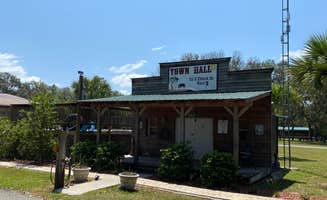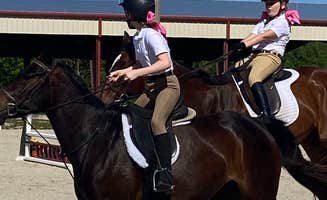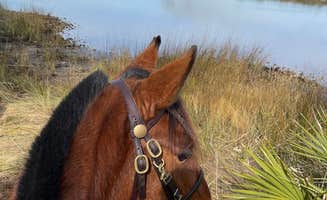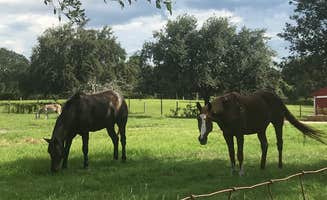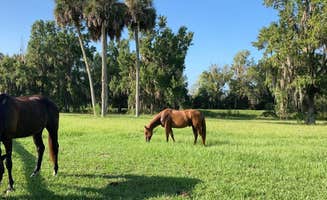Equestrian camping near Astor, Florida offers multiple options for riders across the greater Ocala and St. Johns River region. Located in central Florida's lake country, the area maintains a subtropical climate with average summer temperatures around 90°F and winter lows rarely dipping below 50°F. Trail systems cater to various skill levels with sandy terrain that remains navigable year-round, though summer humidity can reach uncomfortable levels for both horses and riders.
What to do
Trail riding along waterways: Princess Place Preserve provides extensive riding opportunities with spacious equestrian campsites. "I stayed in equestrian site 1 (EQ1) and was amazed by how much space there was and how far we were from others," writes Taylor from Princess Place Preserve. The preserve features multiple hiking and riding trails through classic Florida landscapes.
Visit historic structures: While camping at Princess Place, take time to explore the property's historic buildings. "The Ranger who was working when we were there was really helpful. He gave us a private tour of the historic buildings because no tour was scheduled during our stay," notes Aida K. These structures provide interesting context about the area's past.
Water activities for non-riding days: When taking a break from horseback activities, Wekiwa Springs State Park Campground offers excellent kayaking opportunities. "The park offers hiking, biking, day swimming, a food grill, a canoe/kayak launch and rental, plus tons of wildlife!" says Jenn B. Many equestrian campers appreciate having alternative recreation options during multi-day stays.
What campers like
Spacious, private sites: Most equestrian campers appreciate the generous spacing between sites. "The sites are spacious, spread out and on the water," Justin W. says about Princess Place Preserve, which offers a different experience than the closely packed sites found at some campgrounds.
Wildlife viewing opportunities: The natural setting attracts diverse wildlife. "Saw lots of animals. Everyone was very nice!" reports Caitlyn P. from Wekiwa Springs. For horse campers, wildlife encounters add to the overall experience without causing issues for horses if managed properly.
Peaceful environment: Sawgrass Island Preserve provides exceptional tranquility for campers who prioritize quiet. Tracy L H. describes it as "a fun adventure waiting in Old Florida" and notes that the preserve has "a spot or two with water for the horses and some picnic areas with hitching post to tie off horse and have some time to eat."
What you should know
Water supply challenges: Many equestrian sites require bringing your own water. At Sawgrass Island Preserve, "There is no water available at any of the campsites," according to Tracy L H. Plan accordingly with sufficient water containers for both personal use and horses.
Limited phone reception: Cell service varies throughout the region's camping areas. At Tram Road Equestrian Campground, connectivity is minimal, making it ideal for disconnecting but challenging for those needing reliable communication.
Reservation requirements: Advanced booking is essential. "Sites are reserved well in advance, especially for the weekends so book early," advises Kippy N. about Princess Place Preserve. Most equestrian sites in the region have limited availability compared to standard camping areas.
Campsite conditions: Check recent reviews for maintenance issues. "Unfortunately my gate was off its hinges and had rusted sharp edges. I ended up wrapping it so my horse didn't lacerate himself," reports B H. at Princess Place Preserve. Facilities can deteriorate between maintenance cycles.
Tips for camping with families
Accessibility considerations: Some sites offer better access for those with mobility limitations. At Wekiwa Springs, Lauren W. appreciates that "Jane, one of the park rangers informed us about the ramp for wheelchairs, and a lift into the water!" Such accommodations make equestrian camping more inclusive.
Off-horse activities for kids: The Grand Oaks RV Resort provides family-friendly amenities beyond equestrian facilities. "Just got here June 21st and only been a couple of days but really love the property... Not to mention all the beautiful horses on the property my dog is in love with this place!" says bobby M., highlighting the pet-friendly atmosphere that works well for family trips.
Early arrival planning: Parks with swimming areas fill quickly during peak season. "If you go on a weekend, make sure you go EARLY! Line of car starts around 9am and park will close at capacity," warns Hannah S. about Wekiwa Springs. Plan morning arrivals to secure access, especially when bringing children.
Tips from RVers
Site selection for large rigs: Bulow RV Resort provides options for equestrians with larger trailers. "Driving into the resort I thought I was at a horse ranch in Ocala. Rolling acres of green grass and the biggest oak trees I've ever seen," writes Rob D., though he cautions that standard lots require careful navigation with "No angle so it's a 90deg. backup."
Hookup quality: Check electrical service capabilities before arrival. Ray & Terri F. note at The Grand Oaks RV Resort: "The CG roads are paved and the pads are concrete." This infrastructure supports larger horse trailers with living quarters that require reliable power and water connections.
Maneuverability: Access roads can challenge larger rigs. Diane D. warns about Doe Lake Group Site: "The forest road getting in is very rough and pot holes. But luckily it is a short drive into the camp." When towing horse trailers, advance knowledge of road conditions proves invaluable.


